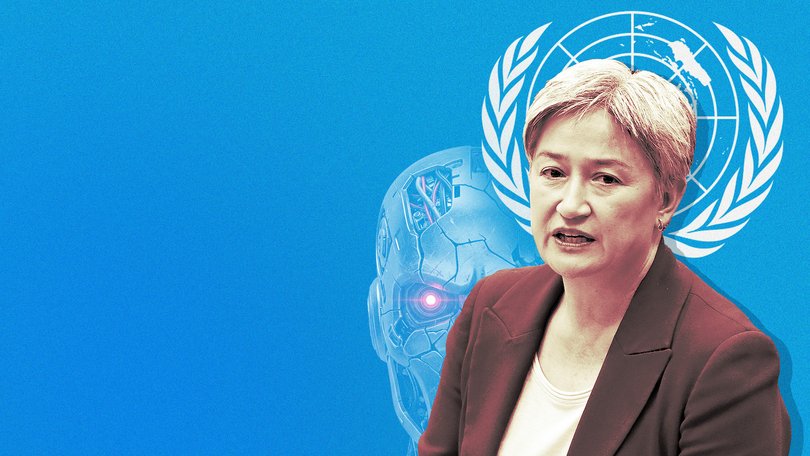AARON PATRICK: Australia’s bid for the Security Council is a Penny Wong vanity project
AARON PATRICK: Campaigns for a seat at the apex of international diplomacy often descend to little more than state-sponsored bribery.

Australia has embarked on a three-year campaign for a seat on the United Nations’ Security Council, the body at the apex of international diplomacy.
Such efforts often descend to little more than state-sponsored bribery. In this case, with the UN probably less influential than at any time in its 80-year history, the Department of Foreign Affairs and Trade intends to spend an estimated $25 million or more on what looks like a vanity project for Foreign Minister Penny Wong.
Australia already contributes $112 million a year to the UN. Other donors, led by the US, are refusing to make further contributions until the body reforms itself. Even China, which benefits from America’s hostility towards the UN, is running late on payments.
Sign up to The Nightly's newsletters.
Get the first look at the digital newspaper, curated daily stories and breaking headlines delivered to your inbox.
By continuing you agree to our Terms and Privacy Policy.The body’s problems reflect the state of the world. Democracy and capitalism are in retreat. Rather than promoting peace and economic development, the UN has become a forum for condemnation of Western values.
Against Israel
The most obvious examples are the annual condemnations of Israel. Two weeks ago at the UN headquarters in New York, 142 states, including Australia, voted for a motion that demanded Israel stop fighting Hamas in Gaza.
The US, a staunch Israeli ally, vetoed the motion in the Security Council. If Ms Wong’s department wins an election in June, 2028, for the 15-member body, Australia will likely find itself voting in the council against its closest military ally on sensitive security matters about the Middle East.
For the opportunity to publicly disagree with the US, Ms Wong and senior Australian diplomats will get the status and excitement of practising diplomacy with the permanent five members of the council, the so-called P5: the US, China, Russia, Britain and France.
The absurdly narrow representation is not lost on anyone involved. While Britain and France promote their egalitarian credentials by switching to the Palestinians’ side, diplomatically, in the war with Israel, they have never pushed for Japan, Germany or any nation in Africa or Latin America to share their veto in the Security Council, which has the authority under international law to approve the use of force by one state against another.
Canberra to the world
Australia has been a member of the Security Council five times since 1946. The latest was in 2013-14, a year veteran Australian diplomats wistfully recall as a high point of Canberran influence on the world stage.
Current and ex officials often cite what has been described as Australia’s role leading the global response to the downing of a Malaysian Airlines Boeing 777 over Ukraine by Russian-armed separatists.
Australia did write a Security Council resolution, which was passed a week after the crash, that demanded Ukrainian rebels not interfere with the crash site. An international investigation was already being instigated and would be led by the Netherlands and the International Civil Aviation Organization, not the Security Council.
Not long after, an American academic reviewed Australia’s performance on the Security Council for the Lowy Institute, a foreign affairs think tank. New York University’s Richard Gowan concluded “Australia has only been able to have relatively limited influence on situations”.
Another example he examined was a motion negotiated by Australia, Luxembourg and Jordan seeking help for victims of the Syrian civil war. Although celebrated as an example of humanitarian diplomacy by middle powers in the face of extreme, state-driven violence, “it boiled down to a call for the Syrian combatants to respect basic international humanitarian law,” according to Professor Gowan.
As all Syrians know, they did not.
Among the most enthusiastic supporters of Australia’s campaign is the United Nations Association of Australia, a private organisation that celebrates international diplomacy. Although well-meaning, the association reflects one of the worst characteristics of the UN: an entrenched and one-sided bias against Israel.
Statements from the group refuse to condemn Hamas, an internationally designated terrorist group, or acknowledge Israel’s right to self defence, a position even the Australian government accepts.
Rise of the machines
In the last day of the UN General Assembly, Ms Wong was allowed to speak to the body she wants Australia to join. In an open debate at the Security Council she raised the prospect of the elimination of humankind at the hands of machines.
“AI’s potential use in nuclear weapons and unmanned systems challenges the future of humanity,” she said. “Decisions of life and death must never be delegated to machines.”
Perhaps Ms Wong has inside information. But no nuclear powers have said they are handing control of their nuclear arsenals to ChatGPT.
If Australia’s campaign to join the Security Council is going to be based on fearmongering about artificial intelligence, perhaps the foreign minister might find more productive uses of her precious time, such as managing tricky relationships with China and the US.

